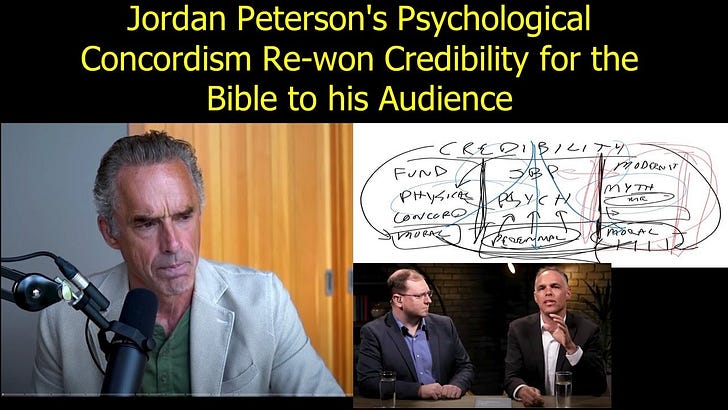Why Jordan Peterson's Biblical Series Re-Established Biblical Credibility for Thirsty Atheists
An Experience of Purpose Is Only Part of the Story
In today's video I offer one of the reasons I see for the success of @jordanbpeterson 's Biblical series.
The scientistic lab leak (removing the first personal from observation in an attempt to establish a monarchical vision) over-elevated a correspondence definition of "truth". The "true" in vernacular, vaguely scientistic speech is what can be seen to correspond to physical observation.
That's not a bad definition of one kind of truth and was vitally instrumental in the scientific revolution, but it is inadequate to account for all way types of knowledge commonly present. See @vervaeke_john 4-Ps of knowing.
In modernity this correspondence theory of truth became the standard for "public knowledge" (this is the scientistic lab leak) and those who wished to "rescue" Christianity and the Bible for the modern world tried to make the Bible meet this standard.
In the modernist/fundamentalist wars the theological modernists embraced pervasive skepticism with respect to the Bible's ability to meet this standard while the Fundamentalists doubled down on the same standard asserting this anachronism could be read back into the Bible.
This war fractured already fractious Protestant churches while older theological traditions tended to weather the storm a bit better (not in everything through) because they already had more deeply integrated other ways of knowing in their practice and theory.
In the minds of many Biblical credibility rested upon the degree that apologists were able to demonstrate the "truth" of the Bible according to this correspondence theory of knowledge.
I don't think this was ever actually the case. People's faith tended to rest on the broader knowledge of the credibility of Christians to love their children and their neighbors more than this modernist standard.
This doesn't mean that a correspondence theory of knowledge is incidental to Biblical truth. That was the error made by many modernists who have in fact fared worse in this time of testing than most Fundamentalist traditions.
The over-reach of this way of knowing assumed in their handling of the Bible has proven to be a better anchor in this storm of skepticism than imagining that the Bible is simply a myth disconnected from physical history.
What @jordanbpeterson did in his Biblical series was to establish a third way toward Biblical credibility. Instead of denying the mythological nature of the Biblical text, as many fundamentalists have done.
He argued for a perennialist psychological concordism where the Bible's credibility for moral truth could be demonstrated with correspondence between modern psychology and a particular way of reading the Bible.
To a generation battered by shallow utopian petty tyrannies of social improvement this perennial wisdom was like a cup of living water and many wanted access to the source.
The symbolic perennialism from @PageauJonathan was a perfect compliment to @jordanbpeterson psychological concordism and so many have followed the path of ancient wisdom back into pre-modern sacramentalist churches.
Expect more atheists to follow as modernity recedes and many of the unworkable offerings of some sorts of post-modernity are found to be shallow or shills of other vacuous-meta-narratives-in-denial about themselves. https://pca.st/syv7kkhe






Wow. This is really interesting. I accidentally jumped to 43:00. I listened for 15 min and found all your insights really useful. Your explanation of the modernist/fundamentalist divide helped me understand why I felt at odds with many in the church. And then your example of three accounts of a car wreck was 🎯. It doesn't mean the wreck didn't happen. It makes me wonder what I've overlooked because I didn't like someone's account of what happened?
I need to go and watch the whole video, but if I didn't get to it, I wanted to make sure I posted a message thanking your for the video.
For years (highschool/college) I struggled with Joshua 10:13; it discredited the Bible IMO. Calvin did a good job explaining how and why science and faith shouldn't be in conflict. They weren't fundamentalists, but there was a tension with this attempt to reconcile science and faith. It wasn't until JBP/Cyprian started describing the themes, the emergent themes of humanity, that something clicked.
I recently listened to this episode with an orthodox priest.
https://podcasts.apple.com/us/podcast/counterflow-with-buck-johnson/id1337741476?i=1000545705995
Before I would have dismissed his position that "we believe it happened/happens, but we don't try to – or need to – explain it." That would have sounded like a cop out to me 10 years ago. But it's like the witnesses of the car accident. The color of the car doesn't matter nearly as much as believing the accident happened and seeing if someone needs help.
The best episode of Cyprian (AKA Vin Armani) to link to is this one (starting about 45 min in):
https://freemanbeyondthewall.libsyn.com/episode-499
He's kind of all over the place, and I don't look to him for answers. I just credit him and Pete Quinones with giving me another lens to view the world and faith through.